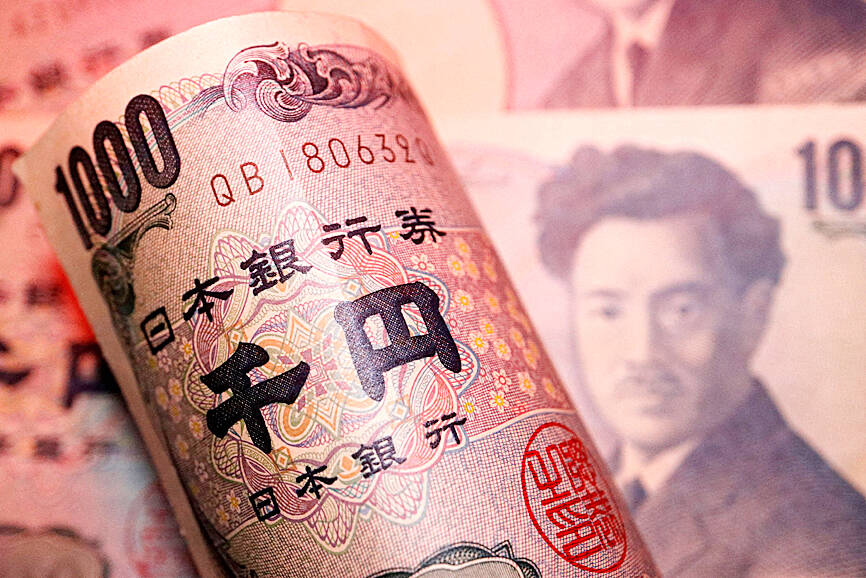Asian currencies rallied to the highest in seven months as ebbing US recession concerns, bets on US Federal Reserve rate cuts next month and an improving domestic backdrop lifted sentiment in the region.
The Bloomberg Asia Dollar Index gained as much as 0.6 percent yesterday to the highest since January.
The South Korean won and the Malaysian ringgit led the regional advance on upbeat growth prospects and the Thai baht rose on easing political tensions.

Photo: Reuters
“It feels like a Goldilocks scenario, where US recession fears fade while growth momentum in the region remains moderate,” Oversea-Chinese Banking Corp foreign exchange strategist Christopher Wong (黃經隆) said in Singapore. “There is room for Asia ex-Japan currencies to recover against a backdrop of developed-market central banks largely on an easing bias.”
The ringgit rose as much as 1.5 percent to 4.3678 per US dollar, the strongest since February last year. On Friday, Malaysia reported a stronger-than-expected increase in second-quarter GDP from the previous year, while global funds poured the most cash into its stock market since June.
The baht extended gains to 34.409 per US dollar, the highest since January, after Paetongtarn Shinawatra on Friday won enough votes in parliament to become the next Thai prime minister.
Goldman Sachs Group Inc economists on the weekend lowered the probability of a US recession in the next year to 20 percent from 25 percent, citing last week’s better-than-expected US retail sales and jobless claims data. They also said they were “more confident” the Fed would cut interest rates by 25 basis points at its policy meeting next month.
Easing concern about a recession in the world’s biggest economy is a positive for Asia’s export-oriented nations. The won rallied 1.52 percent to 1,331.35, the highest since March. The Philippine peso rallied 1 percent to 56.66 per US dollar, its biggest gain since November last year, while the New Taiwan dollar rose 0.81 percent to 32.03 per US dollar, the highest since April.
The yen climbed as much as 1.7 percent versus the greenback to ¥145.19, before trimming the advance to about 1.1 percent as of 5:17pm in Tokyo as traders waited to see if Bank of Japan Governor Kazuo Ueda would provide hints on the central bank’s rate-hike path in his appearance in front of the parliament on Friday.
Regional equities also climbed yesterday, with the benchmark MSCI Asia Pacific Index rising almost 1 percent to head for its highest close in a month.
“The market is envisaging a brighter picture for Asian economies in the coming quarters,” Invesco Asset Management Japan global market strategist Tomo Kinoshita said. He expects investors to allocate more funds to Asian equities, especially to those in India, Indonesia and Malaysia.

MULTIFACETED: A task force has analyzed possible scenarios and created responses to assist domestic industries in dealing with US tariffs, the economics minister said The Executive Yuan is tomorrow to announce countermeasures to US President Donald Trump’s planned reciprocal tariffs, although the details of the plan would not be made public until Monday next week, Minister of Economic Affairs J.W. Kuo (郭智輝) said yesterday. The Cabinet established an economic and trade task force in November last year to deal with US trade and tariff related issues, Kuo told reporters outside the legislature in Taipei. The task force has been analyzing and evaluating all kinds of scenarios to identify suitable responses and determine how best to assist domestic industries in managing the effects of Trump’s tariffs, he

TIGHT-LIPPED: UMC said it had no merger plans at the moment, after Nikkei Asia reported that the firm and GlobalFoundries were considering restarting merger talks United Microelectronics Corp (UMC, 聯電), the world’s No. 4 contract chipmaker, yesterday launched a new US$5 billion 12-inch chip factory in Singapore as part of its latest effort to diversify its manufacturing footprint amid growing geopolitical risks. The new factory, adjacent to UMC’s existing Singapore fab in the Pasir Res Wafer Fab Park, is scheduled to enter volume production next year, utilizing mature 22-nanometer and 28-nanometer process technologies, UMC said in a statement. The company plans to invest US$5 billion during the first phase of the new fab, which would have an installed capacity of 30,000 12-inch wafers per month, it said. The

Taiwan’s official purchasing managers’ index (PMI) last month rose 0.2 percentage points to 54.2, in a second consecutive month of expansion, thanks to front-loading demand intended to avoid potential US tariff hikes, the Chung-Hua Institution for Economic Research (CIER, 中華經濟研究院) said yesterday. While short-term demand appeared robust, uncertainties rose due to US President Donald Trump’s unpredictable trade policy, CIER president Lien Hsien-ming (連賢明) told a news conference in Taipei. Taiwan’s economy this year would be characterized by high-level fluctuations and the volatility would be wilder than most expect, Lien said Demand for electronics, particularly semiconductors, continues to benefit from US technology giants’ effort

‘SWASTICAR’: Tesla CEO Elon Musk’s close association with Donald Trump has prompted opponents to brand him a ‘Nazi’ and resulted in a dramatic drop in sales Demonstrators descended on Tesla Inc dealerships across the US, and in Europe and Canada on Saturday to protest company chief Elon Musk, who has amassed extraordinary power as a top adviser to US President Donald Trump. Waving signs with messages such as “Musk is stealing our money” and “Reclaim our country,” the protests largely took place peacefully following fiery episodes of vandalism on Tesla vehicles, dealerships and other facilities in recent weeks that US officials have denounced as terrorism. Hundreds rallied on Saturday outside the Tesla dealership in Manhattan. Some blasted Musk, the world’s richest man, while others demanded the shuttering of his